Have you ever wondered why some articles posted on Polish media websites look like they were written by robots? Or by people who, instead of using elegant Polish, create some strange clusters of sentences and phrases? Intuition tells us that this is not what professional journalism should look like. To say that SEO in the media is to blame for everything would be an oversimplification. But certainly poor understanding of optimization principles is one of the bane of online journalism..
Because it goes like this. Every day, a gazillion different pieces of content are created on the Internet. And the first page of search results for a given search term on Google shows only 10 positions. So the fight for the top spots in the search engine is fierce.
Who cares most about these positions? Business, of course. The more prominent the link to your site, the more people will click. The more people who click, the more profit. Of course, this is a simplified model, but it roughly captures the essence of things.
- Internet shoe stores want to be as high as possible on the shoe-related keywords that people search for on Google.
- Marketing agencies are cracking down on keywords related to online visibility, for example.
- A pest extermination company wants to be high on the phrases “bed bugs in the apartment” or “ozone treatment of rooms”.
.
.
The battle of the media for high positions
.
The media, in turn, is fighting for high positions for, among other things, passwords related to current events, or news. If the president signed a new law, there was an interest rate hike or a major accident on the A4 – people will go to the relevant articles from Google as well.
As a result, the media, naturally, struggle to get as much exposure as possible on this Google.Advertisers’ money is won by whoever rakes in more traffic to the site.
Of course, some readers manually enter the address of the main page of a particular media outlet in their browser and start reading the news from there. Some go to specific articles by clicking on links posted on Facebook or Twitter. But from the perspective of publishers of large web portals, the greatest potential for generating traffic lies with Google.
When will it be warm? Spring 2020 long-term forecast [SEE]
.
Now the question arises: what do media publishers and journalists have to do to get their articles ranked higher in Google than those of their competitors? The same thing that owners of all other sites do: take care of SEO.
In addition to the technical optimization of the site or obtaining inbound links, content optimization plays a key role. It’s about writing texts in such a way that Google “sees” them and rates them in a positive way, and of course pushes them higher in search results.
And this is where all the embarrassment begins.
For if you misinterpret the rules of SEO or are overzealous in following them, such monstrosities come out:
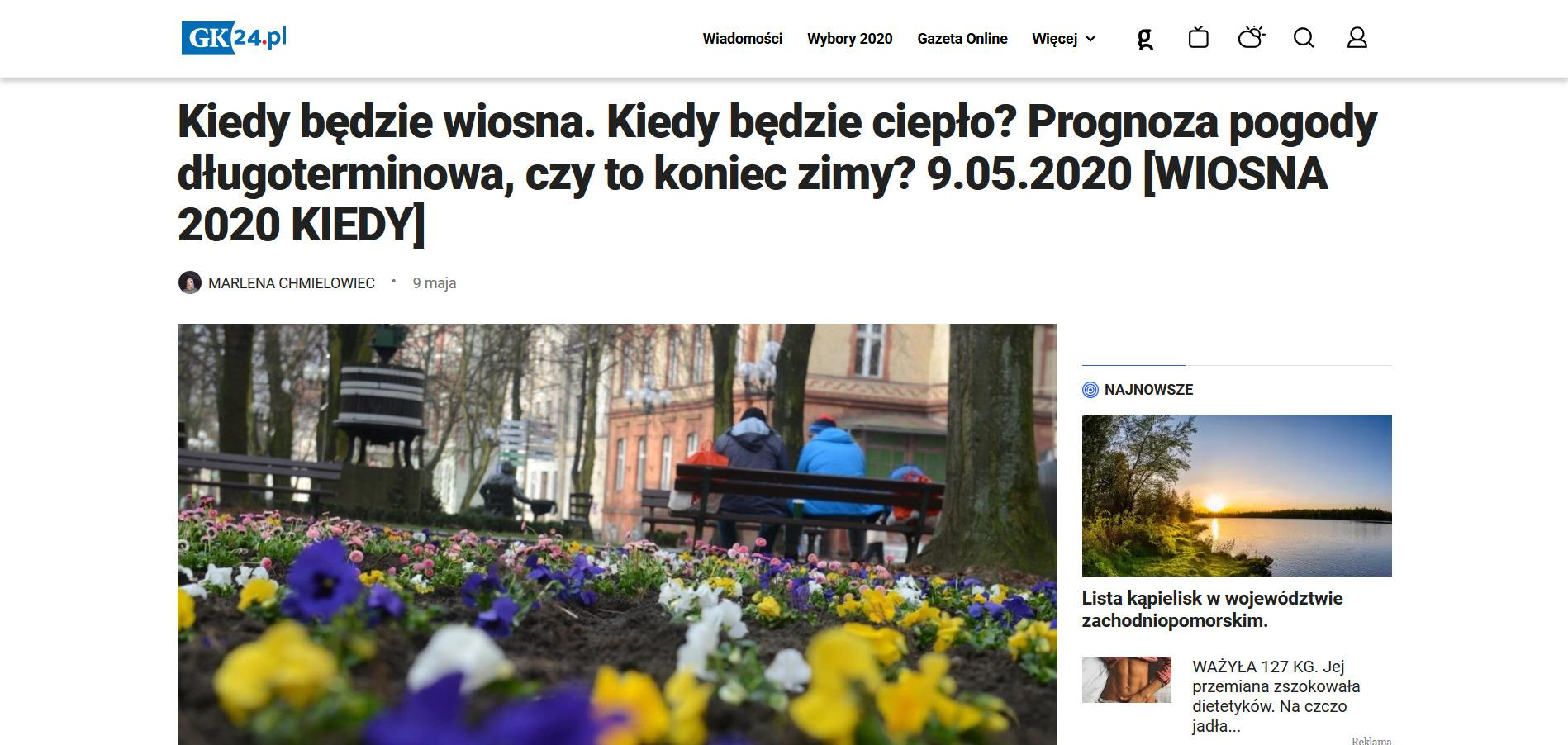 .
.
Głos Koszaliński (GK24.pl) apparently decided to break the bank and appear on Google for several phrases at the same time: when will it be spring, when will it be warm, long-term forecast, is it the end of winter. And finally, the final blow. Ladies and gentlemen: spring 2020 WHEN.
One can conclude that people actually type such search terms into the search engine. But is it necessary to create toothache-inducing titles in order to appear on Google?
What’s too much is not healthy
.
– The use of such treatments by publishers or journalists is very often due to the fact that in the past editors have been able to achieve certain results by oversaturating articles with key phrases. Perhaps a less-experienced SEO specialist has suggested such actions, that it is less important to make sense and read the text than to use as many phrases as possible. However, this is illusory,” explains Grzegorz Strzelec, an SEO specialist who for years headed the SEO departments of Poland’s largest media groups, led by TVN and Onet. He also created the innovative papaSEO SEO skills course.
Grzegorz adds that articles should be written first and foremost to be read well. And if they are to additionally bring SEO results, it is enough if one particular key phrase appears in only a few places, primarily in the lead (first paragraph) and title. It’s also good if it appears in at least one higher-order headline (H2). The assumption is that in the text itself, keywords are supposed to appear naturally, because after all, the whole content revolves around them. There is no need to force anything.
Of course, in addition to the presence of the keyword phrase, the use of headings (mid-headings), the proper construction of address URL and so on are also important. However, when it comes to just saturating the title and text with keyword phrases, excess may not hurt in terms of SEO, but it doesn’t help either. Instead, it spoils the readability and “friendliness” of the article. A grave sin.
In such a situation, the reader either makes an attempt to wade through the disastrously structured content and finally gets to the information he was looking for (but his day has become a tad worse), or he leaves the site and goes looking for information from a competitor.
Bad News on Google News
.
You know Google News? It’s that section at the top of the search results page. When something interesting is currently happening around the search term you’re looking for, news about it will display right in Google News.
Let’s say Bayern Munich met PSG in the Champions League final and the German team won, and Robert Lewandowski became the king of scorers. We type “lewandowski” into Google.
And lo and behold, we see what happens two days later about the Polish soccer player.
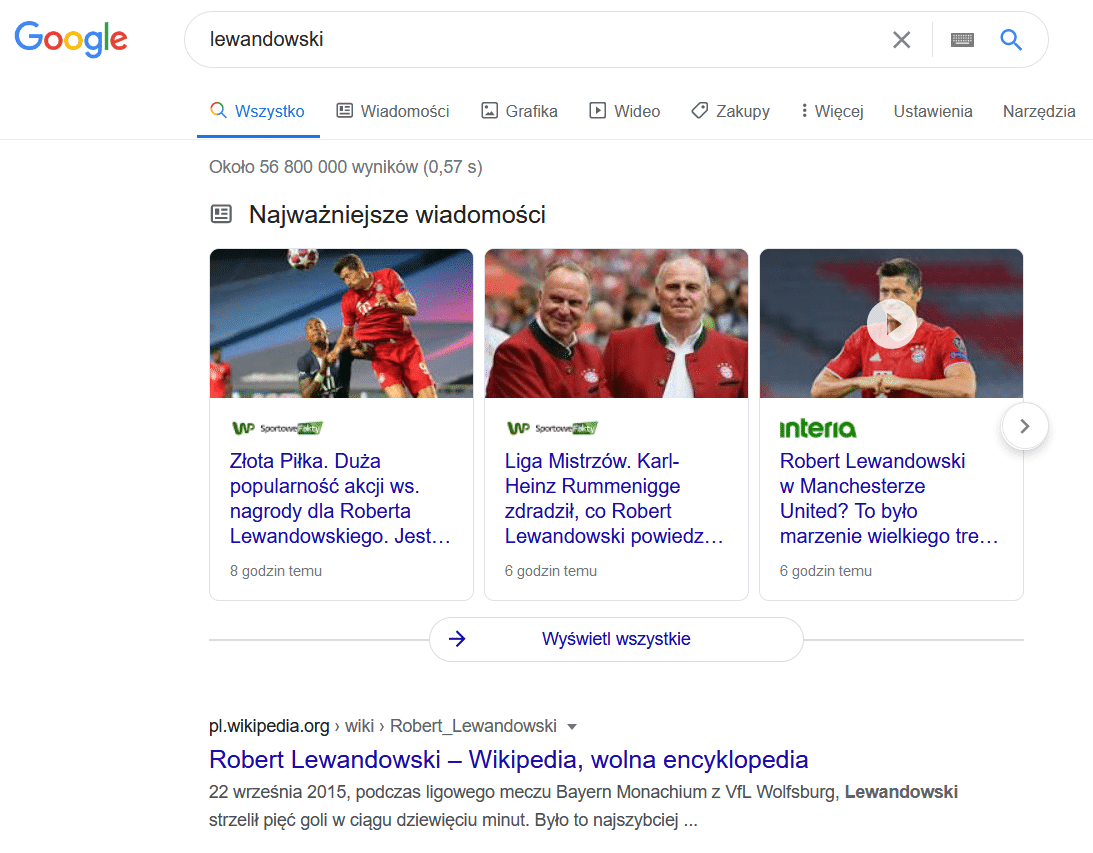
For online publishers, getting found on Google News is quite a treat. Articles show up there for a period of a few hours to a maximum of 72 hours and are clicked on intensively by users. For media outlets, it’s harvest time.
– At one time, Spaniards shut down Google News in their country. The sites immediately saw drops of 20 to 50 percent in their traffic,” said Grzegorz Strzelec during our webinar on SEO for publishers and journalists. In a later conversation with him, I found out what other problem Google News might have.
The imperfection and tamperability of the Google News algorithm means that here, too, publishers along with journalists sometimes over-optimize content. Unfortunately, it turns out that this works in many cases. If a given article drops out of Google News after a few hours of presence there, Gregory says, using coarse techniques from 10 years ago can get the article back in the prestigious block.
One trick for getting an article back into the Google News block is to saturate it even more with a key phrase. Preferably in the singular denominator. Or adding information to the news story that revolves around the main topic of the news, but doesn’t touch the heart of the matter and ends up simply diluting the text. This does not serve the reader, instead it serves the traffic to the site.
It remains an open question whether, since such methods do not serve the reader – frustrating him and flooding him with a mass of unnecessary and poorly edited content – in the long run they will not cause an exodus of traffic toward those media that take the viewer more seriously.
News like Hitchcock, or when will Sunday shopping be [SEE CALENDAR]
.
Will I shop this Sunday? Is this Sunday a shopping Sunday? Commercial Sunday when? Trade-free Sundays 2020 calendar. These are the thoughts going through the heads of many Poles as the week draws to a close. And as they pass through the head, they also need to be typed into Google.
What will appear to our eyes? Well…
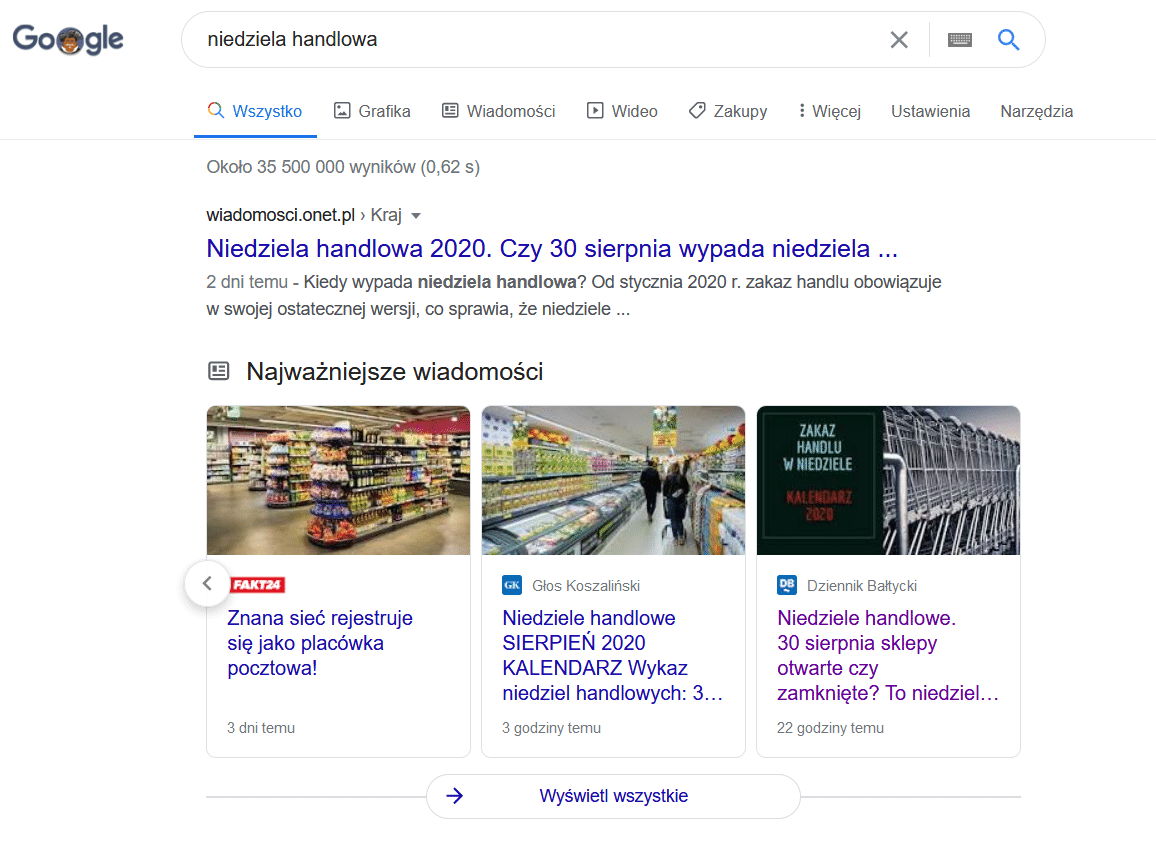
I’m rejecting Fact24 because it doesn’t seem to have an answer to my question. Of the other two items less daunting seems to be Dziennik Bałtycki. I click because I want to quickly find out if I’m going to the electronics store on Sunday to get a set of blank DVDs, a Jack – 2x Chinch cable and a mug with a melody.
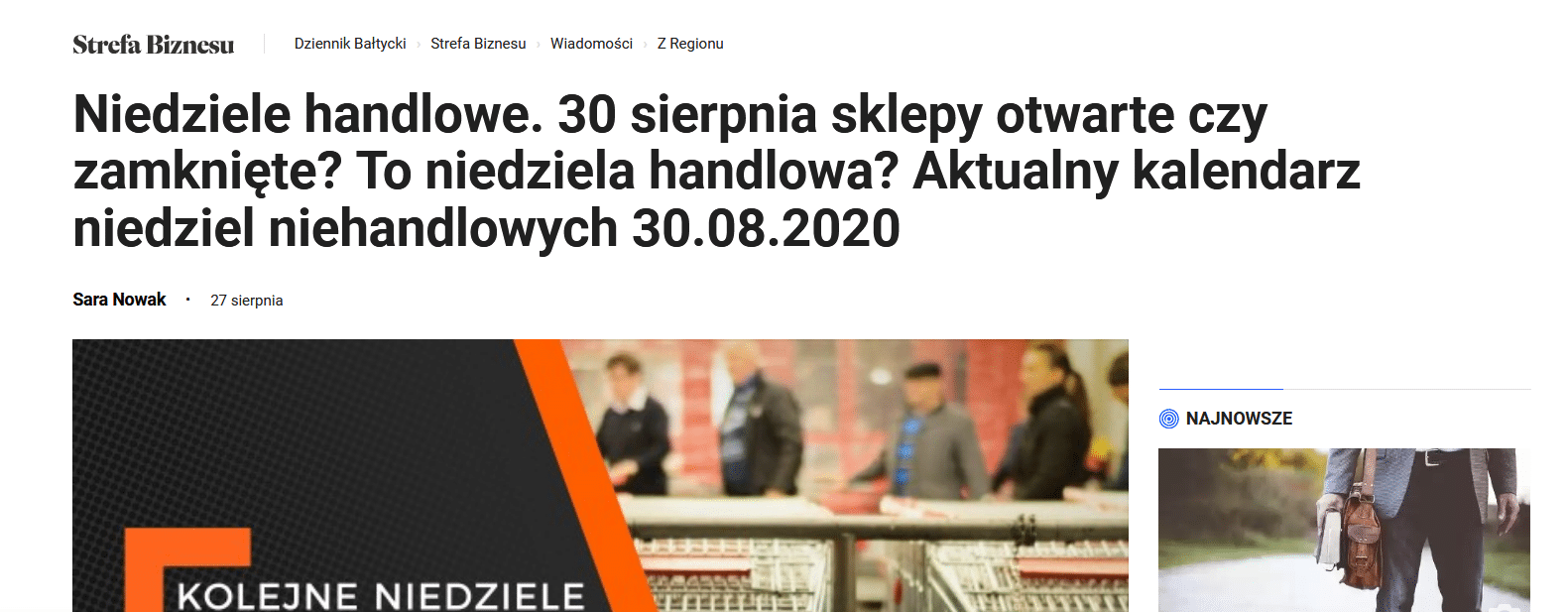
My teeth are already getting used to the pain caused by news titles. I shed a tear, take a sip of tea, and scroll down.
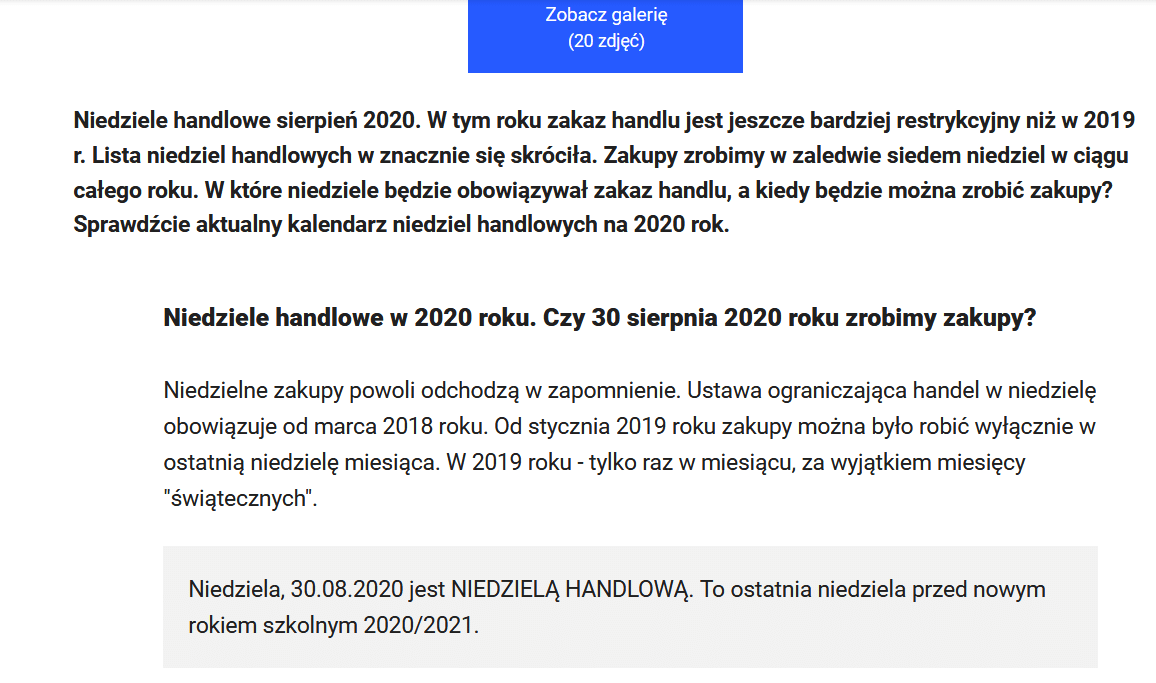
It’s not bad – the information that August 30, however, is a shopping Sunday appears relatively high up, in a gray frame. You don’t have to scroll to the very bottom of the page to get the information you need.
Perhaps the media is moving away from the trend of placing key information near the end of the text – so that the reader spends as much time on the page as possible and sees as many ads as possible along the way.
One of the pioneers of this positive transformation is Onet, which 2-3 years ago introduced so-called bulletpoints on a large scale in its materials. These are bullet points visible at the very beginning of an article, which de facto summarize its content.
Here are the bulletpoints for an article titled “Zbigniew Ziobro oversaw an investigation into illegal financing of his own party. It has been discontinued. We know the official justification”:
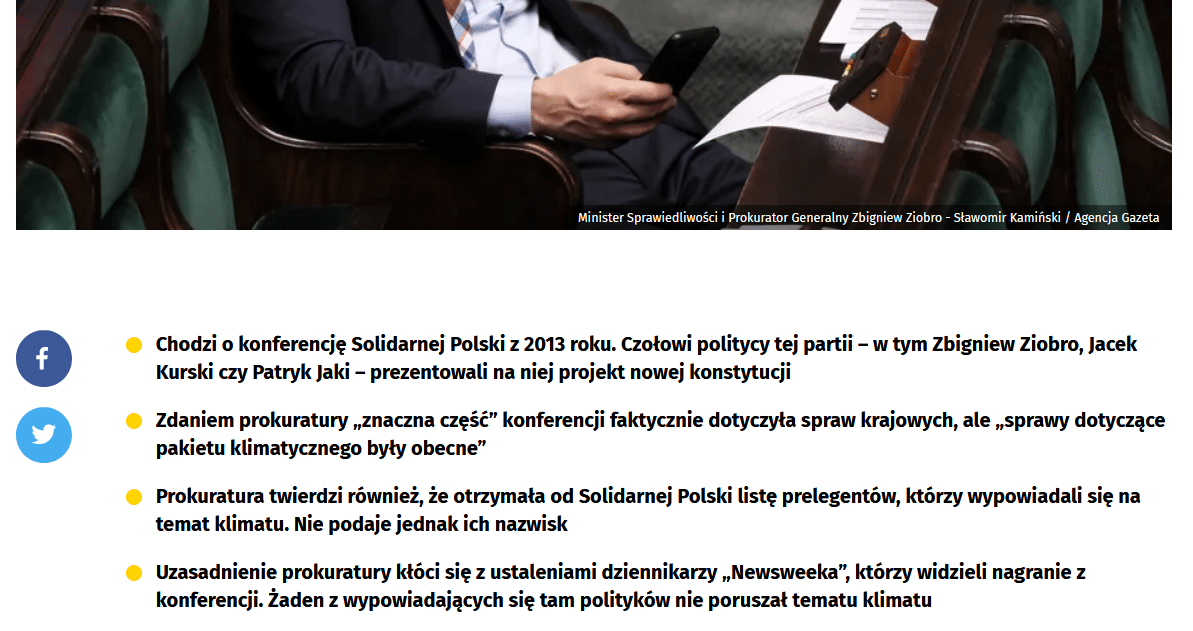
Can you? You can.
– Onet has successfully introduced a bullet-pointed list at the beginning of an article, and somehow it hasn’t – you can check it in the statistics – seen a drop in reach because of it. In most cases, under the list, there is a link to other, similar material. The user came in through mobile, read the bullet point, decided that it was enough for him to be happy. But that he has some time, he clicks on the next material and everyone is happy. We can’t force the user to slog through all our advertising material, because at the very end there is the information he is looking for: that today is not a shopping Sunday after all,” comments Grzegorz Strzelec.
“We can’t force the user,” urges the SEO specialist. What does Głos Koszalin have to say about this?

Again, a familiar feeling in my teeth. I don’t call it a pain anymore, but a feeling just now. That’s how I feel a bit lighter.
Scroll down.
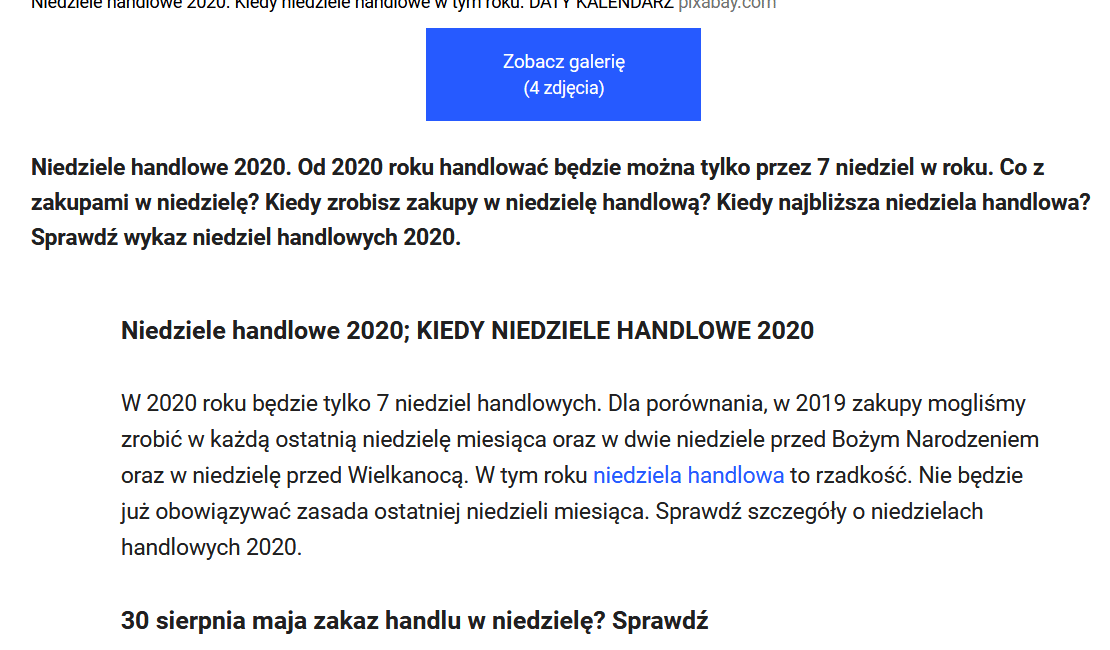
So am I going to make these purchases at the electronics store or not? “Check. After all, I’m checking.
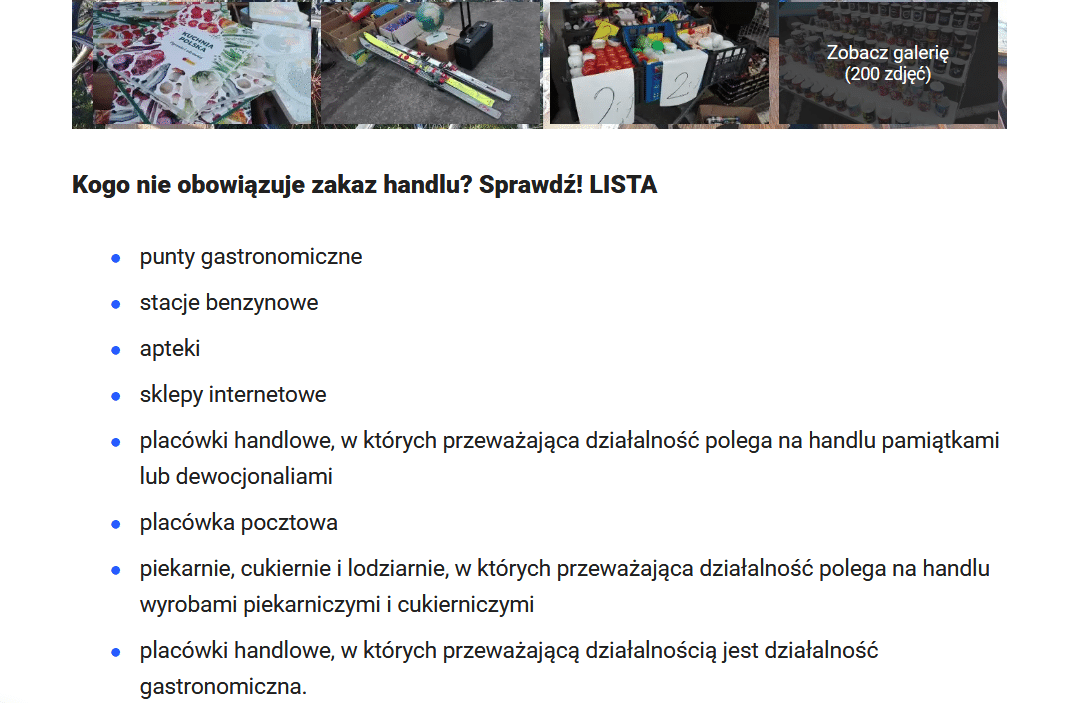
I would now post this gif of Jim Carey tearing his hair out of his head, but I already have too much feeling in my teeth anyway.
I’ll keep scrolling.
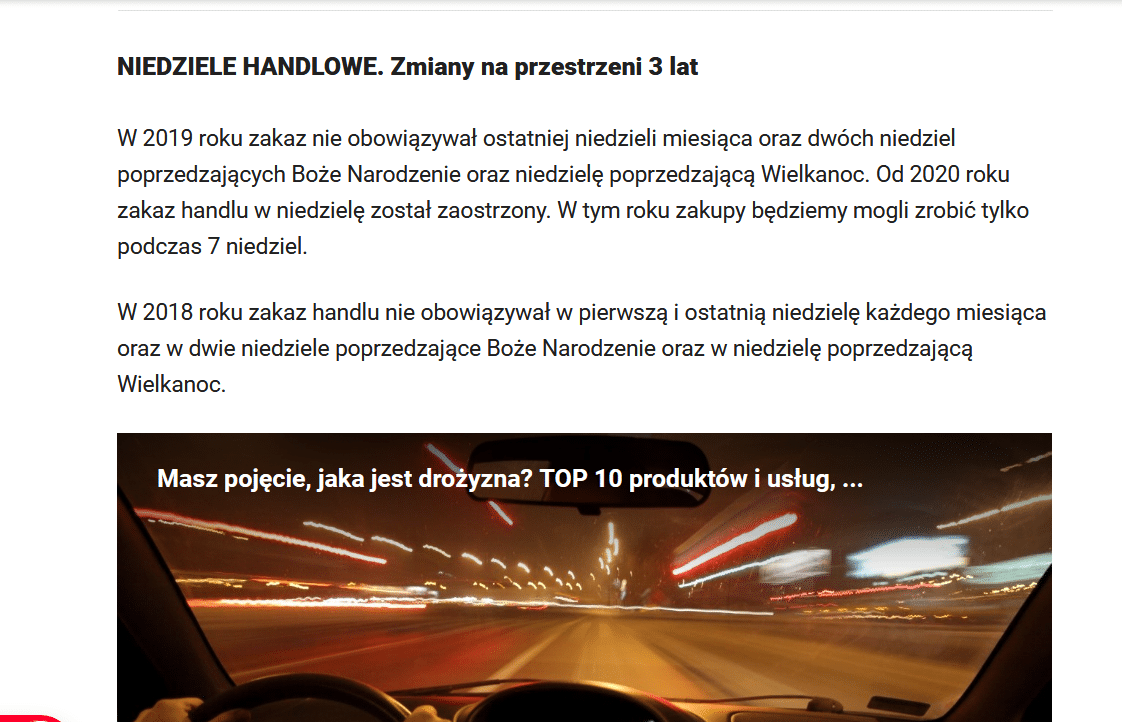
I’m beginning to think that no one in the editorial office of the Voice really knows whether there will be that Sunday trading on August 30, and I’m just wading down the rabbit hole, led by the nose by the powerful forces of the media empire.
Tough luck. I’m scrolling.

I rub my eyes. When all hope was lost, lo and behold, the answer was revealed: August 30 is Trading Sunday. Admittedly, it’s still not the bottom of the page – the news continues – but I’ve had enough internet for today.
Who creates over-optimized media
.
There’s a lot to improve in online media. Let’s add to the above examples video ads set to autoplay and with sound turned on by default, which suddenly attack the reader with an ad for an ointment for itching of intimate places. Or the general oversaturation of journalistic materials with ads.
The primacy of rigid SEO rules over the aesthetics and elegance of the message is still common in many places. Because of this, materials written by journalists who are, after all, alive and perhaps passionate about their profession, look like they have been spit out by an AI-powered machine.
Responsible for this state of affairs in part is everyone. Publishers who force journalists to pursue the company’s business goals instead of serving readers. Journalists, for whom this is fine. Advertisers who look only at the numbers. SEO specialists who suggest grandfathered optimization methods to editors. Google, which creates conditions for not always healthy competition for readers.
And finally, the consumers themselves, who, instead of changing the news portal in a hurry to some more respectful one for themselves and the reader, will keep scrolling the page until they finally find out when that damned shopping Sunday is. And then they’ll still click on the next article, tempted by the title that plays on their emotions. And maybe they’ll even watch a commercial…. and business goes on.
On the right track
.
Despite the habit of constructing such and not other titles, oversaturating articles with key phrases and killing themselves for a place in the Google News block, online editors seem to understand more and more thatapplying SEO principles does not have to mean spoiling the Internet and the reputation of journalists. One can complain, but the Polish Internet looks better today than it did just a few years ago anyway.
The Google News algorithm is constantly being improved and is less and less susceptible to manipulation by publishers.
Bulletpoints, used by the biggest players in the media world, are forcing others to move away from constructing news stories in the fashion of old thrillers.
Savvy (that is, certainly not all) SEO specialists promote moderate playing with key phrases and not deviating from journalistic poetics, in the name of generating more traffic. Because overzealous content optimization may be of short-term benefit to publishers, but in the long run it discourages users who are tired of information chaos and cloying material titles. Such readers, if given a choice, will always prefer to go for clarity of message and enjoyment of content consumption.
 Wojciech Maroszek
Wojciech Maroszek